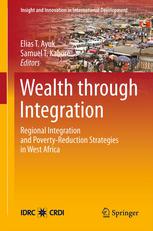

Most ebook files are in PDF format, so you can easily read them using various software such as Foxit Reader or directly on the Google Chrome browser.
Some ebook files are released by publishers in other formats such as .awz, .mobi, .epub, .fb2, etc. You may need to install specific software to read these formats on mobile/PC, such as Calibre.
Please read the tutorial at this link: https://ebookbell.com/faq
We offer FREE conversion to the popular formats you request; however, this may take some time. Therefore, right after payment, please email us, and we will try to provide the service as quickly as possible.
For some exceptional file formats or broken links (if any), please refrain from opening any disputes. Instead, email us first, and we will try to assist within a maximum of 6 hours.
EbookBell Team

4.0
96 reviewsCould regional integration be a first step toward joining the global market? In a context where liberalizing trade has not produced the expected gains in developing countries and growth in global trade has not led to the expected economic growth, an alternative solution has emerged. This new paradigm suggests that trade liberalization should be accompanied by public investment. However, by its very nature, trade liberalization leads to a reduction in revenues from duties and taxes, which means that the available resources for public investments will also be reduced. There are now solid arguments for encouraging the less-developed countries to first emphasize regional integration before trying to access the global market.
This book explores the issues linked to regional integration in West Africa and presents empirical data about the experiences in = West African Economic and Monetary Union (WAEMU) countries to converge their economies. It also examines how these efforts, which make a major contribution to regional integration, influence poverty reduction in the economic and monetary community. It will be of interest to researchers working in this area.
Elias T. Ayuk is Director of the United Nations University Institute for Natural Resources in Africa in Accra, Ghana, and was formerly a senior program specialist at the International Development Research Centre. Samuel T. Kaboré is a researcher/lecturer at the Faculty of Economics and Management at the University of Ouagadougou II, Burkina Faso.
Canada’s International Development Research Centre (IDRC) supports research in developing countries to promote growth and development. IDRC also encourages sharing this knowledge with policymakers, other researchers, and communities around the world. The result is innovative, lasting local solutions that aim to bring choice and change to those who need it most.
Elias T. Ayuk is Director of the United Nations University Institute for Natural Resources in Africa in Accra, Ghana, and was formerly a senior program specialist at the International Development Research Centre. Samuel T. Kaboré is a researcher/lecturer at the Faculty of Economics and Management at the University of Ouagadougou II, Burkina Faso.
Canada’s International Development Research Centre (IDRC) supports research in developing countries to promote growth and development. IDRC also encourages sharing this knowledge with policymakers, other researchers, and communities around the world. The result is innovative, lasting local solutions that aim to bring choice and change to those who need it most.